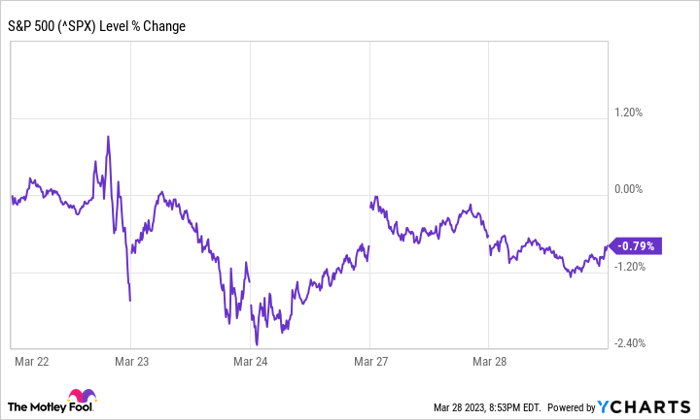Last week’s Federal Reserve press conference might have caused a big reaction in your retirement account. Interest rates are having a huge effect on financial markets right now, and concerns about a recession and a potential banking crisis are pushing those effects to a heightened level. To get the best outcome for your retirement account, learn how the Fed’s announcement is moving markets and how you should handle the associated risks.
The Fed hiked rates again, but softened its outlook
The Fed has been hiking rates in an effort to battle runaway inflation. The central bank hopes that shrinking the money supply will cool an overheated economy, bringing consumer prices back down to earth.
Investors were also carefully monitoring Fed Chair Jerome Powell’s commentary and forward-looking language in the Fed’s press release. Notably, the Fed seems to be softening its outlook despite the latest rate hike. The central bank cited evidence of a cooling labor market, and the latest banking sector turmoil also suggests that rate hikes might need to stop in coming months. The Fed is also certainly aware of slowing growth and deteriorating forecasts in the corporate sector. These are indicators that the Fed is monitoring to time its next policy shift.

Image source: Getty Images.
Ultimately, the latest announcement didn’t result in any drastic changes. It’s now more likely that restrictive monetary policy will stop in the near future, but the Fed maintained its flexibility to react to new economic data. Investors who expected a dovish pivot in response to banking issues were probably disappointed. Conversely, investors who were prepared for another hike now have a reason to believe monetary policy will adjust before forcing economic growth to slow drastically.
How retirement accounts are affected
Capital markets react to changes in monetary policy. More specifically, markets react to changes in expected policy. As investors digested new information from the Fed’s announcement, it caused stocks and bonds to move. That can drive volatility in your retirement account, so it’s important to understand what’s happening and respond accordingly.
High interest rates have historically tended to be bad for stocks. They discourage risk by improving returns on low-risk investments. High rates also stifle economic activity, which is bad for corporate earnings. In theory, stock valuations already reflect the consensus expectations of future interest rate hikes. Equities move higher or lower as those expectations shift in response to new information.
The S&P 500 was climbing ahead of the Fed’s announcement, most likely due to anticipation that the central bank would suspend its contractionary tilt in response to banking turmoil. Major indexes dropped sharply immediately after news broke of another rate hike. However, stocks bounced higher to close out the week, as optimism spread that interest rates would flatten or drop sometime later this year.

If you hold stocks in your retirement account, the Fed’s action probably triggered losses, followed by a partial recovery.
The bond market has been active as well. As interest rates rise, the price of existing bonds tends to fall — bonds with lower rates are obviously less valuable if there’s a higher-yield substitute available. Bond prices charged higher last week, reflecting investor expectations that rate hikes are coming.

Bond prices are also influenced by duration. Investors know that rates will fluctuate over time, so expectations can differ between bonds that mature in two years relative to those that mature in 10 years. This dynamic is represented in the yield curve, which shows the yields for Treasuries of various durations.
The yield curve has been inverted for months, indicating that investors were expecting rates to rise in the short term and fall in the long term. This is usually a strong indicator that a recession is coming. Last week, the yield curve steepened. This is a strong signal that bond investors now expect a rate cut right around the corner.
How to manage your retirement account through the disturbance
For younger investors, this situation underlines the importance of diversification and long-term thinking. Monetary policy and other economic factors can heavily affect stocks in unpredictable and uncontrollable ways. However, the volatility and distortions caused by the Fed are temporary. Over a long time horizon, stocks should recover and grow with the global economy. Prepare yourself for periodic downturns, but stay invested in a number of stocks for the long term.
For older investors who are approaching retirement, this situation illustrates the importance of risk-appropriate portfolio allocation. Investors with short time horizons need to manage volatility by holding the proper proportion of stocks and bonds. Bonds are relatively low-volatility securities, and holding them prevents retirees from incurring insurmountable losses when the stock market falls unexpectedly. If your 401(k) is invested in target date funds, those allocation strategies should be handled for you automatically.
It’s also important to diversify within your bond allocation. Depending on your holdings and needs, rising rates could be good or bad. Higher interest rates lead to higher yields, which is good for retirees. However, the resale value of their existing bonds is also declining. This effect would flip if the Fed cuts rates over the next few quarters. A laddered bond portfolio is a good way to ensure that you enjoy some upside regardless of interest rate changes.
10 stocks we like better than Walmart
When our award-winning analyst team has an investing tip, it can pay to listen. After all, the newsletter they have run for over a decade, Motley Fool Stock Advisor, has tripled the market.*
They just revealed what they believe are the ten best stocks for investors to buy right now… and Walmart wasn’t one of them! That’s right — they think these 10 stocks are even better buys.
Stock Advisor returns as of March 8, 2023
The Motley Fool has a disclosure policy.






